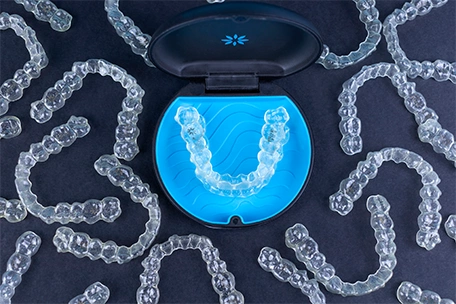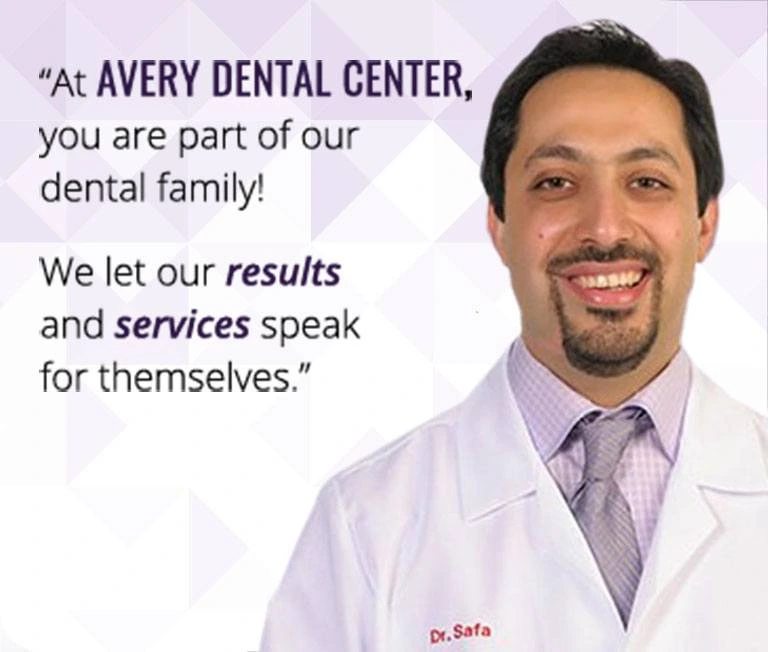“Does Invisalign cause cavities?” This question often sparks curiosity and concern among those considering or undergoing Invisalign treatment. Invisalign is a discreet and effective orthodontic option, but questions about its impact on oral health, particularly regarding cavities, are common.
In this blog, we’ll explore the connection between Invisalign and cavities, discuss preventive measures, and offer practical tips for maintaining oral health while undergoing Invisalign treatment. Before we answer: Does Invisalign Cause Cavities? Let us look into what Invisalign is.
Treatment Length
Invisalign
As short as 6 months, with an average of 12 to 18
Braces
Average of 12 to 24 or more, depending on the type and severity of malocclusion
Can treatment be expedited?
Invisalign
Wear aligners for 20+hours a day, keep teeth and aligners clean, visit the dentist regularly to monitor progress
Braces
Visit the clinic as directed for adjustments, keep teeth and brackets/wires clean and free of plaque, avoid habits that could increase treatment time
Cleaning
Invisalign
Use a soft-bristled toothbrush and non-abrasive toothpaste to gently scrub aligners
Braces
Use an interdental toothbrush and water flosser to remove plaque and bacteria from around brackets and wires
Maintenance
Invisalign
Keep teeth and aligners clean for best results
Braces
Keep teeth and brackets/wires clean for best results
Removable?
Invisalign
Yes, aligners are designed to be removed while eating/drinking and while brushing/flossing teeth
Braces
No, traditional braces cannot be removed until treatment is complete, and the dentist is the only one that should remove them
Visits to dental clinic
Invisalign
Periodically, you need to visit the dental clinic to monitor your progress
Braces
Yes, you will need to visit the clinic every few weeks as teeth shift for adjustments
How much does it cost?
Invisalign
Starts at approximately $1,500 for up to 5 aligners and goes up to around $8,000 for unlimited aligners
Braces
Costs an average of $3,000 to $5,000+, depending on several factors
Benefits
Invisalign
Virtually invisible
Comfortable
Convenient
Braces
Does not require compliance- once braces are attached, they are not removable except by the dentist upon completion of treatment
Ideal for
Invisalign
Mild to moderate malocclusions, can be used for more severe along with attachments, depending on the type of malocclusion
Braces
Mild to severe malocclusions
What is Invisalign?
Invisalign is an orthodontic treatment that uses clear, removable aligners for teeth straightening and correcting bite issues. These custom-made aligners are crafted specifically for each patient, offering a comfortable and discreet alternative to traditional metal braces. Invisalign aligners are made to be worn for most of the day, gently applying pressure to slowly move teeth into their proper positions over time. They are removed for eating, drinking (except water), brushing, and flossing, making them convenient and easy to incorporate into daily life. This technology has made achieving a straighter smile more comfortable and aesthetically pleasing for many individuals seeking orthodontic care.

How Invisalign Aligners Work
Invisalign aligners work by applying gentle, consistent pressure to slowly shift teeth into their desired positions. These custom-made, clear aligners are designed to fit snugly over the teeth, providing a comfortable and nearly invisible orthodontic treatment option. Patients wear each set of aligners for about 1-2 weeks before moving on to the next set, following a carefully planned treatment course outlined by their orthodontist. Over time, this gradual adjustment helps correct misalignments, crowding, and bite issues, resulting in a straighter and healthier smile.
Myth or Fact: Does Invisalign Cause Cavities?
The notion that Invisalign causes cavities is more of a myth than a fact. However, does Invisalign cause cavities? Invisalign aligners themselves do not directly cause cavities. However, improper care and hygiene habits during Invisalign treatment can increase the risk of cavities.
Factors such as inadequate cleaning of aligners, food particles trapped between teeth and aligners, and reduced saliva flow due to prolonged aligner wear can contribute to cavity formation. It’s essential to maintain excellent oral hygiene practices while undergoing Invisalign treatment to minimize this risk. Additionally, does Invisalign cause cavities should be considered, as improper care of aligners can potentially lead to dental issues
Factors Contributing to Cavity Risk with Invisalign
Several factors are responsible for an increased risk of cavities during Invisalign treatment:
- Plaque Buildup: Inadequate cleaning of both teeth and aligners can lead to the accumulation of plaque. Plaque is like a sticky film of bacteria that can produce acids, leading to tooth decay and cavities if not removed regularly.
- Food Trapping: Food particles can get trapped between teeth and aligners, creating a conducive environment for bacteria to thrive. When left unaddressed, this can contribute to cavity formation.
- Decreased Saliva Flow: Wearing aligners for extended periods, especially without breaks, may temporarily reduce saliva flow. Saliva does important work in our mouths by neutralizing acids and washing away food particles. This helps keep cavities at bay and maintains oral health.
- Poor Oral Hygiene: Inconsistent or inadequate brushing and flossing habits can allow plaque and food debris to remain on teeth and within aligners, increasing the chances of cavities and other dental issues.
- Dietary Habits: Consuming sugary or acidic foods and drinks frequently without proper oral hygiene can contribute to enamel erosion and cavity formation, especially when combined with aligner wear.
How to maintain Oral Hygiene with Invisalign?
To minimize cavity risk while undergoing Invisalign treatment, follow these oral hygiene tips:
- Brush and Floss Regularly: Don’t forget to brush your teeth after eating snacks before you put your aligners back in. It’s a good habit to floss every day to prevent any food from getting stuck between your teeth.
- Clean Aligners Properly: Rinse aligners with water before placing them back on your teeth. Use a soft-bristled toothbrush and mild soap to clean aligners daily.
- Stay Hydrated: Drink enough water throughout the day to help maintain saliva flow and oral health.
- Attend Regular Dental Checkups: Schedule dental cleanings and checkups every six months or as recommended by your dentist.
- Seek Professional Advice: Consult with the orthodontist or dentist for personalized oral care recommendations tailored to your specific needs during Invisalign treatment.
- Chew Sugar-Free Gum: Chewing sugar-free gum, especially after meals, can stimulate saliva production. Saliva helps balance acids in the mouth and wash away food particles, reducing cavity risks.
- Use Fluoride Products: Consider using fluoride toothpaste and mouthwash as recommended by your dentist to strengthen tooth enamel and protect against cavities.
- Limit Sugary and Acidic Foods: Minimize consumption of sugary snacks, candies, sodas, and acidic beverages, as they can contribute to enamel erosion and cavity formation. Opt for healthier food choices and drink plenty of water.
Conclusion
Does Invisalign cause cavities? Understanding how Invisalign may relate to cavities is crucial for maintaining excellent oral health during orthodontic treatment. While Invisalign aligners themselves don’t lead to cavities, it’s essential to uphold good oral hygiene practices to minimize any risks. By following recommended dental care routines and seeking guidance from dental professionals, you can fully enjoy the benefits of Invisalign while keeping your dental health in check.
Take proactive steps for your dental health by booking an appointment online at Avery Dental Center, Dublin, OH. New patients can call us at 614-683-9557, while Existing patients can call us at 614-789-9000 for assistance.
FAQs
Does Invisalign cause cavities?
Invisalign aligners themselves do not cause cavities, but improper oral hygiene during treatment can elevate cavity risks.
How can I prevent cavities while using Invisalign?
Maintain excellent oral hygiene, follow Invisalign guidelines, limit sugary foods, attend regular dental check-ups, and seek professional advice.
Are there specific dental care products recommended for Invisalign users to prevent cavities?
Using fluoride toothpaste and mouthwash, along with proper cleaning of aligners, can help prevent cavities during Invisalign treatment.











